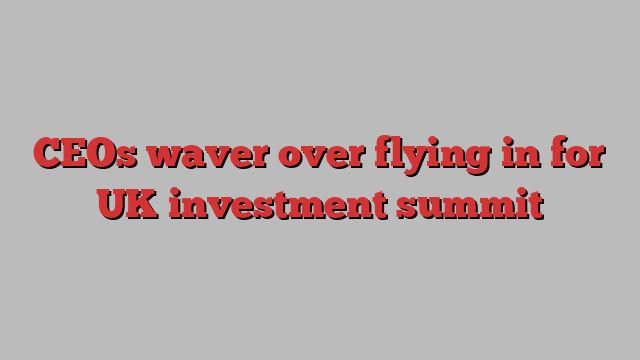
Concerns over the quality and organisation of the UK’s investment summit have left some senior business figures wavering over whether to fly to the event on Monday.
International and domestic executives have been frustrated by a lack of information from the UK government about its flagship gathering in London with some even questioning whether the event will be worthwhile.
People at two overseas companies on the list of those attending told the Financial Times they had received out-of-office responses from some organisers this week when asking urgent questions.
The CEO of a large global business, who is a regular at such UK events, will not make a final decision until the weekend, according to people close to the company. A person at another international group said their CEO had yet to decide whether to fly in for the summit.
While multiple attendees said previous UK investment summits had also been pulled together at late notice and with similarly haphazard communications, several said this year’s organisation was notably poorer.
Organisers accept that the communications around the event would have been smoother if they had more time to prepare. The date of the summit was dictated by a pre-election promise to hold the event within 100 days of Labour taking office after its July 4 election victory.
Prime Minister Sir Keir Starmer will use it to reiterate his promise to bring political and economic stability to the UK after years of upheaval.
Around 200 private sector executives — including Goldman Sachs chief executive David Solomon — are expected to attend the summit, which will feature a Sunday evening reception at Lancaster House, a day of meetings and panels at London’s Guildhall, and a Monday evening event at St Paul’s Cathedral, according to several delegates who have been briefed on the details.
The programme includes speeches by Starmer, chancellor Rachel Reeves and business secretary Jonathan Reynolds.
Starmer will also take part in a discussion with former Google chair Eric Schmidt and GSK chief Emma Walmsley, while former England football manager Gareth Southgate is set to speak on a panel titled: “The UK’s creative assets: soft power as a hard investment opportunity”.
The agenda also includes a talk between BlackRock CEO Larry Fink, Brookfield CEO Bruce Flatt and Carol Young, chief executive of the UK’s Universities Superannuation Scheme, one of the largest investors in Britain, with the theme: “The value of stability: the UK’s comparative advantage”.
Some business people said they had no complaints about the organisation of the event despite the lack of detail. But people at several companies said they were unimpressed with the organisation to date.
A person at a large UK company whose CEO was invited said it was “madness” that the start time and venue for the event had not been confirmed with less than five days to the summit.
Organisers have cited security concerns as a reason not to divulge location details. The level of communication was poor “even by government standards”, the person said.
Executives’ eyebrows were also raised by an email from organisers this week, which inadvertently revealed the email addresses of more than 100 invitees and their staff because an official failed to use the “bcc” function when sending an update on the summit.
The frustrations come as Labour ministers seek to convince businesses that they can look forward to a more professional government and greater political and economic stability after years of upheaval, including Brexit and a series of changes in prime minister.
A government source said: “The proof of the pudding is in the eating. In 100 days, this new government has already managed to attract the great and the good of the investment community to take another look at Britain.”
On Thursday, Darktrace co-founder Poppy Gustafsson was appointed as the UK’s investment minister, charged with making Britain more attractive to global business.
The timing of the event is another challenge for ministers, with major tax decisions due in the October 30 Budget.
“There is a concern that it will be a bit woolly, with little or no content as any policy will be coming at the Budget,” said one person due to be at the summit.
One tech executive said that many venture capital groups and start-ups were unenthusiastic about attending given the threat of tax hikes in the government’s first major financial setpiece this month. “There’s obviously a very rational fear that you have people on stage clapping happily that two weeks later . . . have to raise concerns with policies,” the person said.
In the run-up to the Budget, ministers may be “hyper-nervous” about revealing fiscal plans, said Raoul Ruparel, a director at Boston Consulting Group’s Centre for Growth and former Downing Street adviser.
While executives probably do not “care all that much about the panels and agenda”, they would expect to hear “more than platitudes about the government’s plans” during the event, he added.
The government sought to get on the front foot on Thursday night, championing private investment in the energy sector announced by companies including Iberdrola, Ørsted, Greenvolt and Macquarie.
Ignacio Galán, executive chair of Spanish energy giant Iberdrola, praised the UK’s “clear policy direction, stable regulatory frameworks and overall attractiveness”, as he said his group on its own would spend up to £24bn in the UK between 2024 and 2028.
A Department for Business and Trade spokesperson said: “We are on track to deliver an ambitious programme with some of the most influential investors and business leaders who will attend and represent the best of business from across the globe.”
Additional reporting by Owen Walker, Daniel Thomas and Sylvia Pfeifer